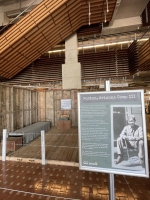The Rebellious Miss Breed
San Diego Public Library
Innovation Synopsis
The Rebellious Miss Breed underscored the activism of hero SDPL librarian Clara Breed who advocated on behalf of Japanese American youth incarcerated during WWII. Nearly 50 programs in 4 months were presented to raise awareness, prioritize Japanese American voices, and discuss historical and contemporary issues faced by marginalized communities.
Challenge/Opportunity
The Rebellious Miss Breed provided opportunities for the public to learn about Clara Breed and the Japanese American incarceration specific to the San Diego region in a myriad of ways. The history of Japanese Americans in San Diego is rarely told and only a fraction of what is taught in California schools. The Rebellious Miss Breed provided different perspectives, venues, and approaches to learn about the incarceration and how this grave injustice affected California’s history. In-person and virtual programs were held.
Key Elements of Innovation
TRMB was unique in bringing ethnic studies to the community via the public library. The goals were to raise awareness of Executive Order 9066, honor Clara Breed, and spark discussion. Programs were developed through innovative partnerships, internally and externally, and multi-jurisdictional collaborations with libraries in San Diego, Los Angeles, and Fresno. TRMB had multiple scholars, culture bearers and community partners including the Japanese American National Museum and Japanese Historical Society of San Diego.
Achieved Outcomes
Among several outcomes including the establishment of an annual civil liberties lecture and the positive social interactions we made with the 142,801 visitors to TRMB programs, the most notable was the 2022 unanimous vote by the San Diego City Council rescinding a discriminatory anti-Japanese Resolution from WWII. They made a formal apology to the Japanese American community. This history-making result would not have been possible without TRMB project and the research and advocacy of SDPL staff.



